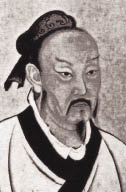| Mencius: Governing the State with Humane Love
By WEN HAIMING
MENCIUS (Mengzi, 372-289 B.C.) is regarded as the “Second Sage” because of his significant role in promoting the thinking of Confucius. He was born in the state of Zou, in what is now Zoucheng City of Shandong Province, but lost his father at an early age and his mother had the most profound influence on his upbringing. They lived first near a graveyard, then near a market, then near a school, each move instigated by the mother’s concern about the effect of the local environment and its people upon her son’s character. In proximity to the school, thanks to the example of those around him, the boy began to learn etiquette and show interest in books.
The story illustrates the important influence of one’s surroundings and underlines the fact that humans as active agents have the power to choose where they want to live. This is part of the Confucian creed that self-cultivation implies cultivating co-existence of one’s body with one’s living environment.
Later, Mencius went on to be educated by Zisi, a grandson of Confucius, and became the second most important Confucian philosopher after the master himself.
Confucius proposed humane love as the central ideal of his political philosophy, but he did not demonstrate a systematic method to realize it. Mencius filled in this gap with a systematic way of practicing humane love, making it the essence of his political and philosophical theories.
Just like Confucius (but with a much bigger entourage) Mencius traveled around various states in an attempt to spread his doctrines, and like Confucius he received the cold shoulder from those who ruled. In his later years, Mencius went back home, discussed and taught followers, and wrote the book of Mencius, which earned him the title of “Second Sage” in Chinese cultural history.
 |
| Mencius. |
Political Philosophy Based on Idealism
Mencius remained strongly idealistic throughout his life. We might say that Mencius is a book full of moral idealism, which places morality above metaphysical thinking. He advocates fostering a mind capable of penetrating the myriad things in the universe, of conceiving the transformation of things and events in the cosmos.
Mencius did not hold the powerful in great awe, believing that status, fame and worldly clout – the things that went to make earthly rulers – to be countered by the “heavenly honors” he himself had been granted, namely kind heart, intellect and integrity. Mencius stressed independent thinking, contending that if one believed everything written in historical books, one might be better off without them.
Under Chinese monarchical systems, the king or emperor had supreme authority. But Mencius took a contrary view, arguing in enlightening fashion that the populace is more valuable than rulers, propounding the notion: “People are the most important, the state is the second most important, and the king the least so.” Mencius supported the “nine-square” system of land ownership, which allowed farmers private land with reduced taxes. For him, the key to a morally stable working class was to ensure stability of their property and livelihood.
Mencius favored a new division of social labor: people who live on their brainpower and those who live by their physical strength. One of his most famous quotes is: “Those who work with their brain rule, and those who work with their muscles are the ruled.”
Mencius took an idealistic approach to the ethical dilemmas in Confucian thinking. For example, a student once asked Mencius: what should King Shun (a sage in prehistory with a notoriously evil father) do if his father murdered someone? Mencius answered that as the state leader, Shun should observe the law and have the Justice Minister arrest and prosecute his father. But, Mencius continued, as a son, Shun could choose to step down from power and flee to seclusion with his father. The philosopher emphasized that the king’s filial duty outweighed his obligation to the nation.
This reply has provoked criticism of Mencius for putting human feelings above legality, arguing that this thinking has bred corruption in Chinese society throughout history. Others disagree, observing that if Mencius really meant Shun could ignore the law, he would have suggested the king prevent the Justice Minister from taking punitive action rather than accompanying his father into exile from the kingdom.
In the scenario of the king’s father committing a felony the Justice Minister also faces a painful conundrum. A core quality of officials in feudal times was to be unconditionally supportive of and submissive to the ruler. Prosecuting the king’s father and thus bringing shame to the royal family clearly runs against this expectation. But as the top judicial functionary, the minister is also obliged to defend justice, the cornerstone of good state governance and acknowledged by both kings and Confucian scholars. This represents the intractable challenge to Mencius’ goal of running a nation with humane love.
| 